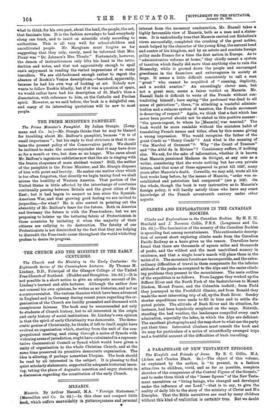Mazarin. By Arthur Hassell, M.A. "Foreign Statesmen." (Macmillan and Co.
2s. 6d.)—In this clear and compact little Wok, which suffers une,yeidably in picturesqueness and personal • interest from the necessary condensation, Mr. Hassell takes a highly favourable view of Mazarin, both as a man and a states- man. It is undoubtedly true that Mazarin carried out Richelieu's views successfully, completed the crushing of the great nobles, much helped by the character of the young King, the natural head and centre of his kingdom, and by an astute and resolute foreign policy made France for a time the first nation in Europe. As to "administrative reforms at home," they chiefly meant a system of taxation which finally did more than anything else to ruin the Monarchy, while it ground down the people and encouraged greediness in the financiers and extravagance in society at large. It seems a little difficult consistently to call a man " great " who cannot be acquitted of "cunning, duplicity, and a sordid avarice." An exceedingly clever man, but not a great man, seems a fairer verdict on Mazarin. Mr. Hassan finds it difficult to write of the Fronde without con- tradicting himself ; here saying "the parlement was dead to all sense of patriotism"; there, "in attacking a wasteful adminis- tration and a ruinous system of taxation, the Fronde movement is deserving of respect." Again, we think that a fact which has never been proved should not be stated in this positive manner : "the queen-regent, to whom he [Mazarin] was married." The book would be more readable without the mistaken habit of translating French names and titles, often by this means giving a wrong impression. Who would recognise the father of the great Conde as "Henry Conde " ? And what is the meaning of "the Marshal of Gramont " Why "the Count of Tresmes" and "the Abbe de la Riviere" ? Consistency suffers, if nothing else. We ask, for the sake of information, whether it is known that Mazarin pensioned loraAme de Sevigne, at any rate as a writer, considering that she wrote nothing but her own private letters, and that none of these appeared in print till 1697, many years after Mazarin's death. Corneille, we may add, wrote all his best works long before, by the means of Mazarin, "order was re- established and patriotism had conquered" (see p. 169). On the whole, though the book is very instructive as to Mazarin's foreign policy, it will hardly satisfy those who have any exact knowledge of the French seventeenth century under other aspects.






















































 Previous page
Previous page